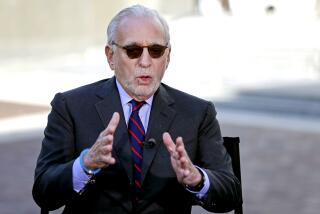Founder’s Proxy Fight Offers Economic Boon : Feud: Warring factions would be paying for services of lawyers, bankers and others.
- Share via
If Carl N. Karcher launches a formal fight for control of the Carl’s Jr. fast-food chain, it could be a boon to Southern California’s economy--or at least to the region’s financial community.
Under well-established rules and customs, the warring factions inside the boardroom of Carl Karcher Enterprises Inc. would each hire a cadre of lawyers, investment bankers, proxy solicitation firms and other experts to gather votes from shareholders.
In addition, newspapers, printing companies, couriers and the U.S. Postal Service would rake in a tidy sum for advertisements, brochures, pamphlets, deliveries and mailings--a feeding frenzy that the company would rather see at its lackluster stores.
“Lots and lots of people would be earning lots and lots of fees,” said Paul D. Tosetti, a securities lawyer at Latham & Watkins in Los Angeles.
“In a hotly contested proxy fight, it’s not unusual to have bills in excess of $5 million or $10 million,” he said.
Whether a battle begins is up to Karcher, ousted Friday as board chairman.
The 76-year-old Karcher has been threatening for months to take his disagreement with company management directly to the shareholders. He wants them to vote for a new slate of directors who would be loyal to him and back his proposal to offer another company’s Mexican food along with Carl’s Jr. dishes.
Except for Karcher’s son, current directors refuse to test the plan, saying that the founder wants to bring in Green Burrito entrees mainly because he would then get a much-needed personal loan from the chairman of GB Foods, Green Burrito’s Anaheim parent company. Karcher denies that his idea is tied to a loan.
Shareholders like Karcher who want to seize control of companies no longer have at their disposal the takeover tools of the 1980s, Tosetti said. Banks are reluctant to lend, and the junk-bond market, which funded the previous decade’s merger mania, is suspect.
That leaves dissident investors little other than proxies with which to wage war, the lawyer said.
Karcher’s personal spokesman, Steven Fink, said Friday that a proxy fight is at the top of a list of options Karcher is considering. However, no decision has been made on whether he will demand a special shareholders’ meeting for a vote on a new slate of directors, Fink said.
With control of 34.2% of Karcher Enterprises’ stock, or roughly 6.5 million shares, Karcher is a force that the board cannot ignore. “It’s pretty hard to have your largest stockholder a dissident, though there’s no absolute certainty that he would win a proxy fight,” Tosetti said.
In addition, the Karcher family controls another 1 million shares, and a St. Louis broker, Bob Martin, said he would help line up votes for Karcher on about 1 million more shares.
“If the nose counting is beginning, I certainly hope the other side is counting as well,” Fink said.
Among the steps each side would take in a proxy fight would be hiring lawyers, investment bankers and, Tosetti said, the “absolutely indispensable” proxy solicitation firms.
The costs would skyrocket, fueled by expenses such as required newspaper advertisements, printed pamphlets and proxy solicitations, all of which fall under special rules enforced by the U.S. Securities and Exchange Commission.
“What really runs up fees is litigation,” Tosetti said. “One side could challenge the accuracy of the other side’s solicitation materials, which have to conform to SEC rules. The materials are supposed to be truthful, not fraudulent or misleading.”
Such a battle could drag on for months and costs could rise sharply if the combatants go to court.
Karcher’s large stake in the company means he would have an advantage in gathering the support needed to win.
“Even in the most contested proxy fights, only 80% to 90% of the shares are actually voted,” Tosetti said. “Usually, it’s more like 70% to 80%.”
The lower the turnout, the more likely Karcher would win, for he would need only a simple majority.
About two-thirds of Karcher’s personal stake in the company is pledged to two banks as security for personal loans.
More to Read
Inside the business of entertainment
The Wide Shot brings you news, analysis and insights on everything from streaming wars to production — and what it all means for the future.
You may occasionally receive promotional content from the Los Angeles Times.










